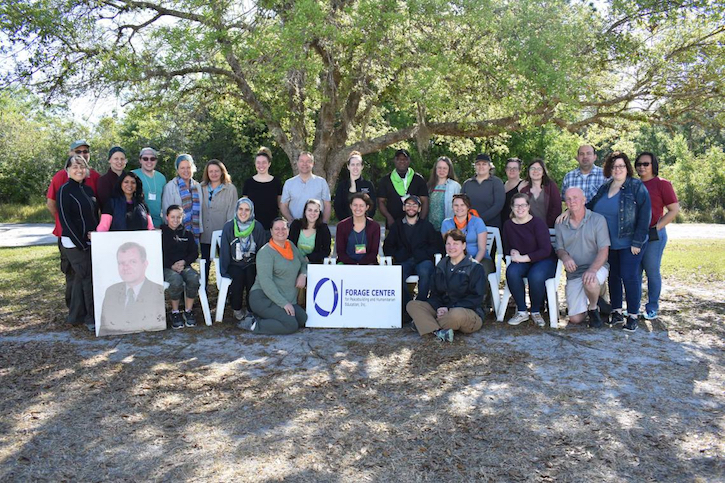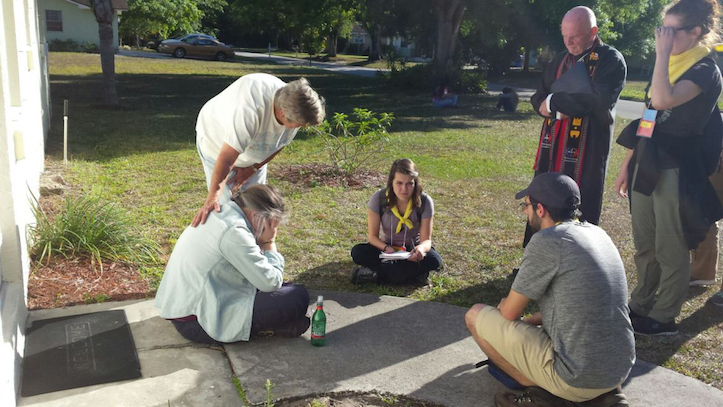
Coastal Promise 2018 Simulation Class Photo
By John Dale Grover
Have you ever wondered what it would be like to be a humanitarian aid worker overseas? Have you ever wanted to learn more about the work of the International Committee for the Red Cross? Have you wondered if aid work is the right career path for you? These questions were on the minds of eleven different students, including two from George Mason’s School of Conflict Analysis and Resolution (S-CAR), who spent part of their spring breaks roleplaying aid workers in a full-immersion simulation.
Twice every year, Adjunct Professor David J. Smith, who teaches at S-CAR, runs a graduate-level simulation of what it is like to be a first responder in a complex humanitarian and peacebuilding emergency. Professor Smith is also President of the Forage Center for Peacebuilding and Humanitarian Education, Inc., the nonprofit which oversees the 70 hour non-stop simulation in Fellsmere, Florida. This year’s spring simulation was called Coastal Promise 2018 and was set in the fictional country of Costero.
Professor Smith always encourages his students, and any other graduate students around the world who are interested, to attend. “Many graduate students are interested in working in the field, but have limited experience. The simulation allows them to experience what being an aid worker might be like,” he indicates. The Forage Center also offers scholarship to help offset the cost for certain participants. This year, S-CAR MS student John Dale Grover and Certificate Program in Advanced Skills in Conflict Analysis student Peter Kent attended for the first time.
The eleven participants of Coastal Promise 2018 represented the program’s most diverse class with nine different universities represented from around the world, including New York University, Georgetown University, Drexel University, American University, Gaia University, University of Alabama at Birmingham, Brescia University, Creighton University, and our own George Mason University.
When the simulation was over everyone had a lot to talk about. The experience was a unique one, with the class interacting with thirty to forty volunteers from the Forage Center and the surrounding communities in and around Fellsmere. These volunteers all role-played different people from Costero such as officials and internally displaced people.
The volunteers had fun and took their roles seriously. Some had previous aid experience, some were invested because they had lived through real-life humanitarian disasters, and some were from Indian River Charter High School and Sebastian River High School. As a result, the volunteer role-players greatly added to the realism of the whole exercise and provided many learning opportunities to the eleven class members. The simulation felt immersive and everyone got really into it, pushing themselves and each other to do the best they could with each crisis they faced.
Conditions in real-life fieldwork in a developing country can vary greatly, and in this scenario, the eleven classmates were thankful that they had at least a roof over their heads and running water at their base of operations. In addition, because of the small class size, everyone got to try out different tasks. The variety of duties included first aid, dealing with trauma, assisting internally displaced people, managing logistics, handling security, and conducting field assessments. Through a mix of trainings and teamwork, they attempted to work their way through problems that real-life teams experience when trying to engage in peacebuilding and the implementation of international humanitarian law.
It was an experience that everyone thought was worth going through, even though it meant having to do without showers and running on a lower amount of sleep and food than might be normal for someone well off in the first world. All participants were also required to give up their cellphones and computers for the duration of the simulation so that they would be without outside contact and fully engaged in the scenario. A career in international aid work isn’t for everyone, but the simulation was enlightening for those who attended. Everyone walked away having learned something about themselves and about real-life crises. The class also gained a greater respect for those who do international aid work, regardless of whether each member plans to go into the field themselves. It was worth attending and everyone who went recommend that others give it a shot.
For those interested in attending in the future, please contact the Forage Center at info@foragecenter.org. The simulations are open to all graduate students interested in peace and aid work and there is also a scholarship available to help applicants attend the program. The Forage Center will soon announce the dates and location for the November 2018 exercise as well as information on a program in May 2018 at La Roche College in Pittsburgh, PA.

Coastal Promise 2018 - Talking to Evacuees at the Local Catholic Church
